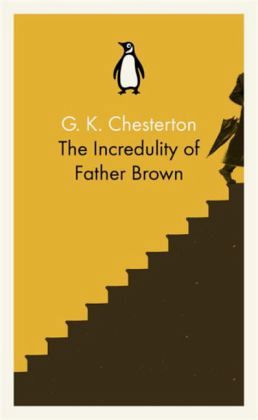Nicht lieferbar

The Incredulity of Father Brown
Versandkostenfrei!
Nicht lieferbar
Weitere Ausgaben:
The third volume of stories featuring the cunning clerical sleuth Father Brown. Ahead of a new series of the popular BBC adaptation starring Mark Williams, all five of Chesterton's original Father Brown books have been republished with charming and collectible Penguin covers.'That sort of thing may be very well for crypts and cloisters and all sorts of moonshiny places. But ghosts can't get through a closed door in an American hotel.'Father Brown, the shrewd and modest clerical detective, encounters miracles, ghosts and prophets in this third volume of ingeniously plotted tales. From South Ame...
The third volume of stories featuring the cunning clerical sleuth Father Brown. Ahead of a new series of the popular BBC adaptation starring Mark Williams, all five of Chesterton's original Father Brown books have been republished with charming and collectible Penguin covers.
'That sort of thing may be very well for crypts and cloisters and all sorts of moonshiny places. But ghosts can't get through a closed door in an American hotel.'
Father Brown, the shrewd and modest clerical detective, encounters miracles, ghosts and prophets in this third volume of ingeniously plotted tales. From South America to New York, his keen observation and quiet wisdom are a match for any mystery - even when he finds himself missing, presumed dead, in his own coffin ...
G. K. Chesterton was born in 1874. He attended the Slade School of Art, where he appears to have suffered a nervous breakdown, before turning his hand to journalism. A prolific writer throughout his life, hisbest- known books include The Napoleon of Notting Hill (1904), The Man Who Knew Too Much (1922), The Man Who Was Thursday (1908) and the Father Brown stories. Chesterton converted to Roman Catholicism in 1922 and died in 1938.
'Chesterton knew how to make the most of a detective story' Jorge Luis Borges
'That sort of thing may be very well for crypts and cloisters and all sorts of moonshiny places. But ghosts can't get through a closed door in an American hotel.'
Father Brown, the shrewd and modest clerical detective, encounters miracles, ghosts and prophets in this third volume of ingeniously plotted tales. From South America to New York, his keen observation and quiet wisdom are a match for any mystery - even when he finds himself missing, presumed dead, in his own coffin ...
G. K. Chesterton was born in 1874. He attended the Slade School of Art, where he appears to have suffered a nervous breakdown, before turning his hand to journalism. A prolific writer throughout his life, hisbest- known books include The Napoleon of Notting Hill (1904), The Man Who Knew Too Much (1922), The Man Who Was Thursday (1908) and the Father Brown stories. Chesterton converted to Roman Catholicism in 1922 and died in 1938.
'Chesterton knew how to make the most of a detective story' Jorge Luis Borges




